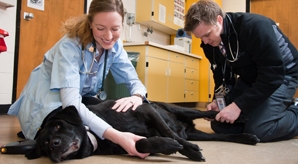Small Animal Orthopaedics
What to Expect at Your Appointment
Most patients and owners can expect the following when arriving for their appointment.
Note: If you have a primary care veterinarian, please let us know when you fill out your paperwork while checking in at the front desk. It also is helpful to bring any of your pet's medical records, X-rays, medications, or special food. This is so we can best understand your pet's history and make the best treatment decisions.
- After checking in at the front desk, you will be greeted by one of our fourth-year veterinary students.
- This student will escort you and your pet to an exam room where the student may perform an initial physical exam and discuss your goals for your pet's visit.
- You will likely be invited to wait in the waiting area while the student and a veterinarian complete a thorough physical and orthopaedic examination.
- At this time, we'll discuss findings and potential action plans for treatment.
- We will then propose a plan and discuss options and costs with you. You are an important part of the decision-making process, so feel free to ask lots of questions about your pet's condition and treatments.
- If you wish to proceed with the plan, it may include outpatient diagnostics (e.g., X-rays, CT scan, joint fluid collection), medications, or hospitalization for surgery.
- If there is special preparation you must do for your pet's treatment or surgery, such as witholding food, your clinician will talk with you about it at this time.
- Surgery often is scheduled the day after this initial appointment, but can be scheduled according to your needs. Our surgeries are completed by our highly trained orthopaedic surgeons together with their surgical residents. Our students may assist during surgeries, but these are largely observational learning experiences for our fourth-year veterinary students.
- In most cases, a pet will be hospitalized for one or two nights after surgery. If your pet is hospitalized, you will be kept updated about your pet's status.
- At the time of discharge, you will be provided a complete set of verbal and written instructions for the care of your pet.
- Your pet may need help getting into your vehicle and travelling home once discharged, so it is a good idea to bring a crate for your vehicle or have an additional person to hold the pet during the drive.
- We encourage recheck examinations at our hospital, but we are happy to work with your primary care veterinarian if that is a more feasible option for you.

